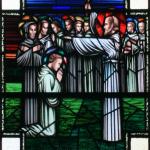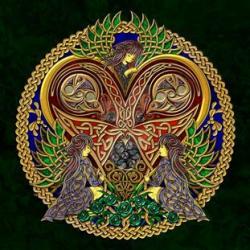 Celtic Christian thought seeks to mend a fracture in general revelation. Western Christianity has caused this fracture in its war on science. Western Christianity has privatized religion and used science to violate the earth (Simpson, 1994). Secular humanism and Greek philosophy, which advocates for this compartmentalization has caused a drifting away from general revelation. And has shrunk its importance to the life and theology of the Christian. This drifting has led to many Reformed and Pentecostal movements to misinterpret general revelation and the purpose of Genesis 1:28. Having dominion over the planet does not mean to dominate the planet and abuse it.
Celtic Christian thought seeks to mend a fracture in general revelation. Western Christianity has caused this fracture in its war on science. Western Christianity has privatized religion and used science to violate the earth (Simpson, 1994). Secular humanism and Greek philosophy, which advocates for this compartmentalization has caused a drifting away from general revelation. And has shrunk its importance to the life and theology of the Christian. This drifting has led to many Reformed and Pentecostal movements to misinterpret general revelation and the purpose of Genesis 1:28. Having dominion over the planet does not mean to dominate the planet and abuse it.
Christ as the Center of the Universe
In the Celtic Tradition, Christ is the center of the universe, the keystone in the structure which God designed (DeWaal, 1997). In this way the natural and the supernatural are forever linked. The general revelation of God is sacred and must be treated as such. Imagine what the world would look like if we treated the general revelation of the earth the same as we treat our holy scriptures.
Celtic theology sees God in all things; therefore, all things have value. The soil has as much value as the Bible since it feeds us physically as the Bible does spiritually. Both are from God and both were given to us for our betterment and the betterment of others.
Jesus Saves more than Humanity
The Salvation of Jesus Christ is for humans, but also for the salvation of God’s creation as well. Colossians 1:20 states:
God made peace through His sons’ death on the cross and so brought all things back to Himself, both on earth and in heaven.
Like General and Special revelation, the salvation Jesus brings an imperative for humankind, but has farther reaching effects than just humans. The salvation of nature and its return to an Eden like perfection is also a future result of salvation. In the same way the fall effects all, so does salvation. Celtic Christianity seeks to rejoin the telescope and the Bible. They were never meant to be enemies. In doing so we will understand nature and scripture in a more full and holy way. We will also understand our creator in a more and wholesome way.
Characteristics of Experiential Revelation
Experiencing God as a revelation is a unique way in which Celtic theology views revelation from God. How can God be experienced is often a question that is not quite explained by Special or General Revelation. The experiences of the believer are often downplayed in modern churches in The United States and Europe. There is a fear amongst scholars that making experience a part of the revelatory process can somehow taint the revelation as the imperfect human attempts to interpret the experiences.
But nevertheless, Jesus was an experiential person, He interacted with the disciples. The fact that Jesus taught in parables is proof that Jesus and His teachings could be best explained by experiencing them in the everyday. Experiential revelation can be found in every interaction. Jesus is in the cup of communion and in the eyes of the beggar. God is reflected in the beauty of a sunset and the feeling of accomplishment after an honest day’s work. The Holy Spirit is experienced in worship, in teaching, in preaching. He is experienced in pleasures and in the pains this life brings.
Ever since God created the world his invisible qualities, both His eternal power and His divine nature, have been clearly seen; they are perceived (experienced) in the things that God has made. -Romans 1:20
Jesus Used General Revelation
In Luke 19 Jesus declares the stones themselves would start shouting, even if the supporters keep quiet. God is experienced at the altar and at the riverbank. Experiential revelation has less to do with a person and more to do with how God uses Special and General revelation to be experienced by the believer. Even non-believers can have these experiences and they likely occur all the time. When we are taken aback by the stars in the sky, or a newborn sleeping infant, we are experiencing God.
St. Columbanus is quoted as saying “If you want to know the creator, first understand and know creation!”. Experiential revelation is the way in which we journey through what is made plain to us in creation and in scripture. It ties the first two corporate revelations into a very personal and intimate revelation of God to the traveler. Experiencing God is what makes God personal to us and a personal savior for us.















